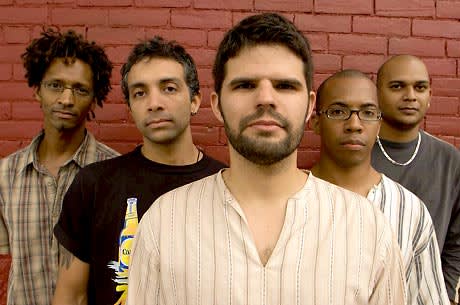Independence is one of those rare records that you will encourage everyone in your vicinity to get. Merging calypso, roots reggae, acoustic performance, dub studio techniques and Trinidadian/Jamaican cultures, Kobo Town is a unique, stylistic, transnational composite of rhythm, poetry and activist journalism. Like the great Calypsonians of his birthplace in Port-of-Spain (Lord Kitchener, the Mighty Sparrow), Toronto-based songwriter Drew Gonsalves constructs incisive social commentary with humour, panache and unforgettable rhythm/melody combinations. Take the jumpy, Carnival-ready "Trinity, or the moody tale of murder and deception, "Abatinaî, which are songs of dense graphic and musical description, and cut bone deep into the listeners subconscious. Likewise, the dancehall-inspired "Across the Dark Waters and the lazy Kingston skank of "At the Edge of the City fuse inter-Caribbean sounds, histories and moods in an altogether formidable package. Independence is somewhat of a concept album, recorded between Trinidad and Ontario, of a diasporic son coming to terms with the home country and falling in love with it all over again through the eyes of his new home. Dont be surprised if you too fall in love with Kobo Town.
What does the name Kobo Town signify? Drew Gonsalves: I named the project Kobo Town as a tribute to the place that helped give birth to calypso. It was the centre for the stick fighting art called Kalenda and there was a lot of rhythm and singing involved while people were jumping around and beating each other up. Calypso grew out of the boastful taunts that people used to sing around the circle of stick fighters.
Do Calypso fans tend to be purists? Well, you find a lot of people that would call themselves Calypso purists have made a peace with the drum machine I could never make! Our fan base is really mixed actually. Id say about half is West Indian, but we also have college students, the world music crowd and the reggae audience.
Can you tell me a bit about your approach to writing lyrics? One of the things I try to do in my own songwriting is to engage [the] imagination by building songs on stories and/or images. Politically conscious music often gets tied down into abstract phrases and words. Like, for example, what does liberty mean? It could mean a hundred things to different people. The best way to relay a message is to tell a story or present somebody with an image. It is something they can smell, taste and imagine.
(Music Dish)What does the name Kobo Town signify? Drew Gonsalves: I named the project Kobo Town as a tribute to the place that helped give birth to calypso. It was the centre for the stick fighting art called Kalenda and there was a lot of rhythm and singing involved while people were jumping around and beating each other up. Calypso grew out of the boastful taunts that people used to sing around the circle of stick fighters.
Do Calypso fans tend to be purists? Well, you find a lot of people that would call themselves Calypso purists have made a peace with the drum machine I could never make! Our fan base is really mixed actually. Id say about half is West Indian, but we also have college students, the world music crowd and the reggae audience.
Can you tell me a bit about your approach to writing lyrics? One of the things I try to do in my own songwriting is to engage [the] imagination by building songs on stories and/or images. Politically conscious music often gets tied down into abstract phrases and words. Like, for example, what does liberty mean? It could mean a hundred things to different people. The best way to relay a message is to tell a story or present somebody with an image. It is something they can smell, taste and imagine.
